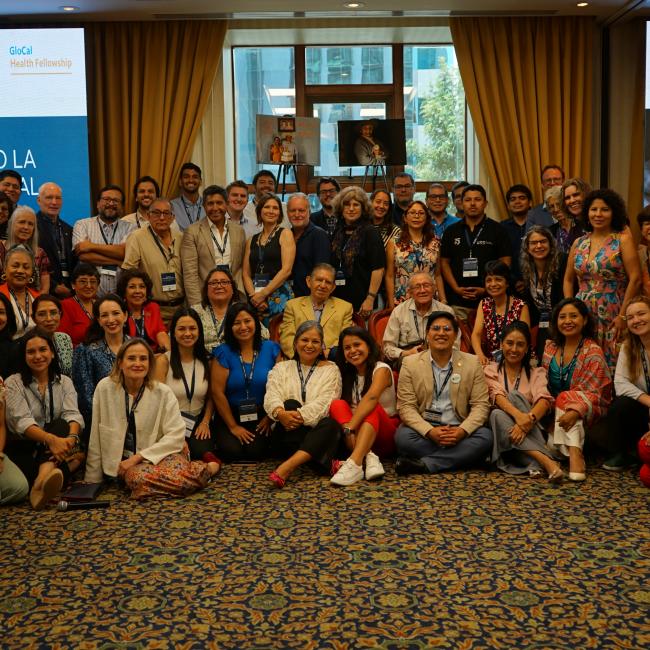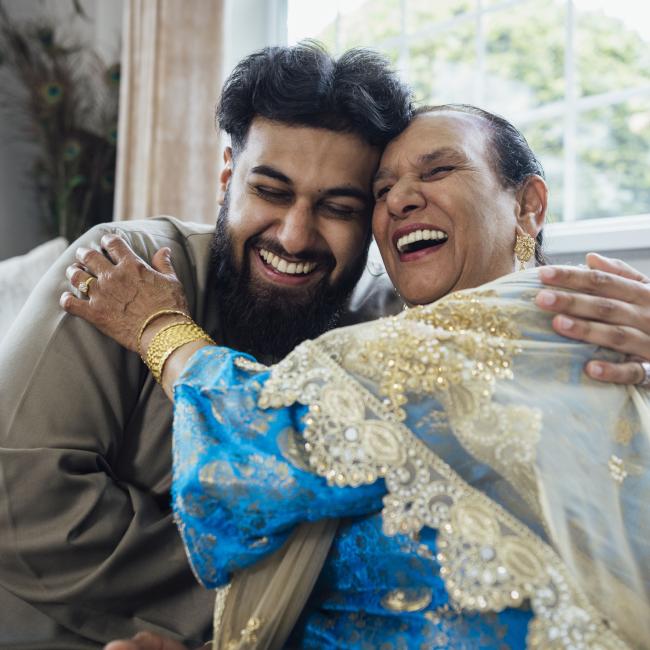Empowering French Researchers: A Fellow’s Insights from the Fondation Alzheimer–Atlantic Fellowship
In this perspective, Atlantic Fellow Agathe Vrillon reflects on her motivations, highlights, and aspirations throughout her fellowship, offering valuable insights for prospective applicants seeking to explore this transformative opportunity.

Atlantic Fellows for Equity in Brain Health (from left to right) Paulina Ruíz, Regina Paradela, Agathe Vrillon, Ayda Tefera, and Armagan Uysal at Leadership Week in Accra, Ghana. Photo by Selorm Attikpo.
Embarking on a journey of professional development and global impact, Agathe Vrillon, a neurologist and researcher at the Cognitive Neurology Center, Lariboisière University Hospital, France, shares her insightful experiences as the inaugural Fondation Alzheimer Atlantic Fellow for Equity in Brain Health.
Through the collaborative partnership between Fondation Alzheimer and the Global Brain Health Institute (GBHI), Agathe delves into the multifaceted realm of dementia research and advocacy, participating in the French Alzheimer’s Atlantic Fellows for Equity in Brain Health Program.
Agathe's journey showcases the transformative opportunities the program offers for French early career professionals in the field of dementia research and advocacy. From interdisciplinary collaborations to international exchanges, her experiences reflect the program's commitment to fostering innovative approaches and global perspectives in the fight against Alzheimer’s disease and related disorders.
Niall: What inspired you to pursue the Fondation Alzheimer–Atlantic Fellows for Equity in Brain Health program?
Agathe: As an early career clinician-researcher, I was keen to gain international experience and expand my professional network. Additionally, I wanted to approach dementia from a broader perspective, including disciplines beyond neurology or neuroscience. I also had great feedback from previous fellows on all the experience they gained and how it accelerated their career!
Could you share some highlights or memorable experiences from your time as a fellow so far?
During our leadership week in Accra, Ghana, we heard from experts from the African continent who are advancing dementia care and changing the life of patients and caregivers. Through practicing leadership, we can increase the impact of our work and drive real change. Hearing their stories was truly inspiring.
Additionally, through sessions focused on Patients and Public Voice, we listened to patients and caregivers who do advocacy work and help other patients and families going through dementia. In the clinical setting, working in the lab of Lea Grinberg deepened my understanding of neuropathological lesions in dementia and their clinical manifestations.
I’m learning to think more expansively in my research and to use collaborations for greater impact.
—Agathe Vrillon, Atlantic Fellow for Equity in Brain Health
What surprised you most about the fellowship?
I am amazed by all the clinical and research opportunities that are made available to us. Through clinical lived experiences, we could spend time in a wide range of clinical and research settings tailored to our specific needs and interests.
How has the program influenced your approach to work and leadership?
The formal training in health policies, economics, and artistic approaches, coupled with networking opportunities at conferences and seminars, broadened my perspective. I’m learning to think more expansively in my research and to use collaborations for greater impact.
In what ways do you collaborate with other fellows or mentors within the program?
I have received amazing mentorship from my local my mentor GBHI at the University of California, San Francisco: guidance for research projects, on getting funding, and introduction to collaborators. There has also been plenty of opportunities for multidisciplinary collaborations with other fellows. I have started an artistic collaboration to record a song that will be used for advocacy purposes with another fellow, who is a musician and teacher, something I never imagined doing. The fellowship made this connection between neurology and music possible.
What impact do you hope to make through your fellowship project or research?
I will finish the fellowship training year with new research expertise and lifelong connections with researchers and dementia advocates. I will bring this new expertise as I return to carry on my clinical and research work in my home memory clinic. This fellowship has already taught me how to ‘think bigger’ in my work, and how to better collaborate and maximize the impact of my work.
About the Fondation Alzheimer and Atlantic Fellow Partnership
Fondation Alzheimer and the Global Brain Health Institute have partnered to launch the French Alzheimer’s Atlantic Fellows for Equity in Brain Health Program. This initiative empowers medical researchers with innovative training, extensive networking, and a 12-month immersion at the University of California, San Francisco, or Trinity College Dublin. The program focuses on interdisciplinary education in epidemiology, statistics, ethics, law, and leadership to drive global change in Alzheimer's research and treatment. Learn more.
Authors

Agathe Vrillon, MD, PhD
Neurologist

Niall Kavanagh
Communications Officer




